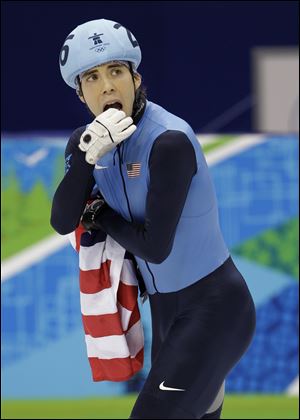
Ohno makes history U.S. skating star claims 6th career medal
2/14/2010
Apolo Anton Ohno reacts after taking the silver medal in last night's short-track 1,500 meters.
VANCOUVER - Boxed out by the South Koreans, with all hope of a medal appearing lost, Apolo Anton Ohno could only count on the freakishness of short track to pull it out.
When two skaters ahead of him went sliding into the padding, Ohno stuck his skate across the line, and Olympic medal No. 6 was his.
The American who made the soul patch fashionable - even the women were wearin' em - pulled out a silver in the 1,500-meter final when the two South Koreans took each other out on the final turn, allowing Ohno to tie Bonnie Blair for the most medals won by a U.S. Winter Olympian.
The Koreans still got the gold, which went to Lee Jung-su. But Ohno had no complaints about being the runner-up, especially when he was fourth with just a
few meters to go. It didn't hurt to see 19-year-old American teammate J.R. Celski right behind him for the bronze in his first major event since a gruesome crash at the U.S. trials.
Ohno, who now has two medals of each color, moved past Eric Heiden as the most decorated American male at the Winter Games and also claimed the mark all to himself for most short track medals since the wild-and-wooly sport joined the Olympic program.
Ohno grabbed an American flag, though he had to put it under one arm when he held up his fingers for the crowd - all five on the left hand, and another on the right.
Make it six, and he has three more events to pass Blair at the Vancouver Games.
LONG TRACK SPEEDSKATING: Four years ago, Chad Hedrick opened his first Olympics with a gold medal in the 5,000 meters, pumping his arms and smiling broadly.
Not this time.
Hedrick finished 11th yesterday as the defending champion in the first long track speedskating event of the Vancouver Games. Teammate Shani Davis was one spot behind in 12th, and American Trevor Marsicano was 14th.
Of the trio, Hedrick likely had the best shot at a medal, while Davis' and Marsicano's strongest races are the middle distances.
"I think all three of us are going to bounce back pretty good for the middle distance races," Hedrick said. "Those guys were just too good out there."
Sven Kramer of the Netherlands won the 5,000 in an Olympic record time of 6 minutes, 14.60 seconds.
Hedrick finished in
6:27.07; Davis was clocked in 6:28.44; Marsicano finished in 6:30.93.
Hedrick said he felt every bit of his 32 years on the big oval.
He changed tactics and went back to a style of skating he used during his inline days because the ice felt sticky under his clapskates.
"We weren't getting a lot of glide on the straightaways," he said. "I thought I was going to keep the cadence of my pushes up, and push more frequently than everybody else to keep my speed up.
"I did that pretty well, but I feel like it wasn't the right plan. Those guys were cruising out there, and they really put up some tough times for us to beat."
Six laps into the 12 1/2-lap race, Hedrick's lap time slowed from 30.1 seconds to 30.7.
"I never could get it back," he said. "I had to accelerate and waste a lot of energy to get back to that 30-second lap. When you do that, you're just not efficient. The next thing you know it's three or four laps to go and your tongue is on the ground."
Davis skated against Kramer in the most anticipated matchup of the event.
"I gave him a good run for about four or five laps."